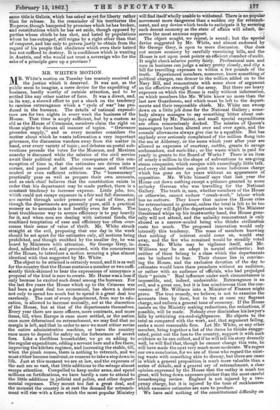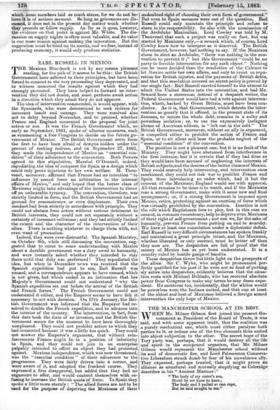MR. WHITE'S MOTION.
MR. White's motion on Tuesday has scarcely received all the justice which it deserved. It was not, as the public seem to imagine, a mere device for the expediting of business, hardly worthy of outside attention, and to be settled like any other matter of form. It was a direct, and, in its way, a shrewd effort to put a check on the tendency to careless extravagance which a "cycle of war" has pro- duced in the bureaux. The details of national expendi- ture are for two nights in every week the business of the duced in the bureaux. The details of national expendi- ture are for two nights in every week the business of the House. That time is amply sufficient, but by a custom as old as the House of Commons, members claim the right on those nights to discuss all manner of topics. "Grievance precedes supply," and as every member considers the matter about which he wants information a very important grievance, the discussion wanders away from the matter in hand, over every variety of topic ; and debates on postal sub- ventions precede the votes for the Museum, and Mexican anarchy is discussed while the salaries of the civil service await their political audit. The consequence of this con- sumption of time is, that the estimates are driven into a corner, and passed at last almost en mane, and without control or even sufficient criticism. The "bureaucracy" practically pass as well as prepare their own accounts, and as each chief believes that the constitution exists in order that his department may be made perfect, there is a constant tendency to increase expense. Little jobs, too, which could not escape exposure in a fair and full discussion, are carried through under pressure of want of time, and though the departments are generally pure, still a practical secrecy as to accounts is not healthy even for them. The least troublesome way to secure efficiency is to pay heavily for it, and when men are dealing with national funds, the combined temptation of ease and efficiency too often over- comes their sense of value of thrift. Mr. 'White struck straight at the evil, proposing that one day in the week should be set apart for the estimates only, all motions being prohibited, and though snubbed by the smaller fry, be was heard by Ministers with attention. Sir George Grey, in- deed, admitted the evil, and promised, with the concurrence of the House, to introduce a motion securing a plan almost identical with that suggested by Mr. White. The object to be attained is certainly sound, and it is as well for the country that the House contains a member or two suffi- ciently thick-skinned to bear the expressions of annoyance a proposal of the kind is sure to create. Mr. Hume was a loss if only because he excited such dread among the bureaux. For the last five years the House which up to the Crimean war had been a great deal too economical, has shown a desire not only to spend too much but to spend it a great deal too carelessly. The cost of every department, from war to edu- cation, is allowed to increase annually, not at the discretion of the House, but at that of the departments themselves. Every year there are more officers, more contracts, and more items, till, when Europe is once more settled, or the nation once more determined on retrenchment, we may find that no margin is left, and that in order to save we must either revise the entire administrative machine, or leave the country once more to depend for safety on the forbearance of secret foes. Like a thriftless householder, we go on adding to the regular expenditure, adding a servant here and a fire there, improving the kitchen regimen, and increasing the stable, till, when the pinch comes, there is nothing to retrench, and we must either become insolvent, or consent to take a step down in life. Just at this moment we are at law, and the expenses of the suit are so vast, that little additions to the minage almost escape attention. Compelled to keep under arms, and spend millions on fortifications, we have hardly a care to attend to the little additions in judicial and police, and other depart- mental expenses. They mount too fast a great deal, and the moment the country is at rest the demand for retrench- ment will rise with a force which the most popular Ministry will find itself wholly unable to withstand. There is no popular movement more dangerous than a sudden cry for retrench- ment, and any device which tends to anticipate it by securing such decent economy as the state of affairs will admit, de- serves the most anxious support. The object sought, we repeat, is sound ; but the special device suggested by Mr. White, and almost endorsed by Sir George Grey, is open to more discussion. One does not secure economy by carefully examining bills, and the House is not upon most points an efficient chamber of audit. It might check salaries pretty fairly. Professional men and men in business can judge a salary pretty closely, and clip a bill for travelling expenses to within a few pounds of the truth. Experienced members, moreover, know something of political charges, can demur to the million added on to the Navy Bill, and remonstrate with some show of argument on the effective strength of the army. But there are heavy expenses on which the House is really without information, on which members like Mr. White know no more than the last new Guardsman, and which must be left to the depart- ments and their responsible chiefs. Mr. White can swoop down on a little job done for the National Gallery ; some- body always manages to say something bitter about out- lays signed by Mr. Panizzi, and small special expenditures are often remorselessly docked. The salaries of Queen's messengers have been altered over and over again, and the consuls' allowances always give rise to a squabble. But has anybody ever seriously complained of the million flung into the sea at Alderney, or the sums which year after year are allowed as expenses of courtesy, outfits, grants to savage ambassadors, and such-like ; or the waste which is paid for yearly in grants to the Board of Works ? There is an item of nearly a million in the shape of subventions to sea-going steam companies, which escapes with exceedingly, little talk, and every old member can point to some ludicrous charge which has gone on for years without an appearance of opposition. Mr. White himself says that last year the House cut down nothing except a pittance granted to some Unlucky German who was travelling for the National Gallery. The truth is, men, whether members of the House or otherwise, cannot endure "crank-work," labour which has no outturn. They know that unless the House cries for retrenchment in general, unless the total is felt to be too heavy, they will fight the departments in vain. The Minister threatened whips up his trustworthy band, the House gene- rally will not attend, and the unlucky remonstrant is only abused as a narrow-souled being who thinks civilization costs too much. The proposed innovation would only intensify this tendency. The mass of members knowing that nothing of interest could come on, would stay away, and the few who remained would be steadily voted down. Mr. White may be vigilance itself, and Mr. Williams may' be an adept in mental arithmetic ; but neither of them belong to a class which the departments can be induced to fear. Their chance lies in convinc- ing the House, and the exclusive devotion of the day to estimates would leave them preachers without an audience, or rather with an audience of officials, who had prejudged their "points." Real influence under such circumstances is impossible, and, indeed, undesirable. Extravagance is an evil, and a great one, but it is less mischievous than the con- version of Mr. Williams into a Minister of Finance might prove. The true remedy, we believe, is not to examine the accounts item by item, but to tax at once any flagrant charge, and enforce a general tone of economy. If the House insists on the Ministry making reductions, the reductions, if possible, will be made. Nobody ever diminishes his lawyer's bills by criticizing six-and-eightpences. He objects to the total as compared with the work, and, that argument failing, seeks a more reasonable firm. Let Mr. White, or any other member, bring together a list of the items he thinks exagge- rated, point out the loss to the country, support it with such evidence as he can collect, and if he will tell his story decently well, he will find that, though he cannot change this vote, he will have made the next very much more moderate. We regret our own conclusion, for we are of those who regard the exist- ing waste with something akin to dismay, but there are cases in which a general proposition is much more valuable than a series of details, and a general cry of retrenchment, a clear opinion expressed by the House that the outlay is much too great, will bring down expenses quicker than the most careful housekeeping review. England is not injured by a two- penny charge, but it is injured by the tone of recklessness which excessive estimates are sure to produce. We have said nothing of the constitutional difficulty on which some members laid so much stress, for we do not be- lieve it is of serious moment. So long as grievances are dis- cussed, it does not in the present day matter much whether they precede or follow supply. As far as it goes, however, the evidence on that point is against Mr. White.. The dis- meal= on supply nights is often most valuable, and its value is one more reason against making the innovation. But the suggestion must be tried on its merits, and we fear, instead of producing economy, it would only produce statistics.































 Previous page
Previous page